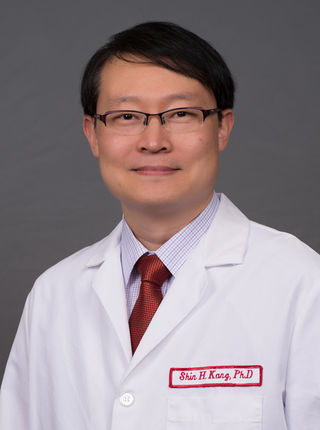Shin H. Kang, PhD
Assistant Professor, Neural Sciences
Assistant Professor, Shriners Hospitals Pediatric Research Center

- Contact Information
-
- About Me
-
Research Interests
Glial Progenitors and Oligodendrocyte Abnormalities in CNS Diseases
We are interested in cellular and molecular mechanisms that underlie regenerative glial responses to CNS injury. Glial cells play critical roles in CNS repair, as well as in normal brain functioning. In particular, the mature mammalian CNS has abundant glial progenitors that behave like stem cells as being able to proliferate and differentiate into oligodendrocytes, the myelin-forming cells. As myelinating oligodendrocytes are essential in axonal metabolic support and rapid signal propagation, the stem cell-like glial progenitors and their development into mature oligodendrocytes serve as important regenerative mechanisms in the injured brain and spinal cord. More interestingly, these glial progenitors also directly monitor local neuronal activity by forming synapses with neighboring neurons. Thus, multiple cell-cell signaling mechanisms between neuron and glial progenitor, or between mature and immature glia may underlie the dynamic regenerative behaviors of these progenitors to replace damaged oligodendrocytes and to support white matter integrity. In numerous CNS diseases, however, the progenitor-derived regeneration appears to be misregulated and oligodendrocyte abnormalities are not repaired. The ultimate goals of our laboratory are to understand the cellular and molecular basis of cell-cell signaling that regulate the regenerative progenitor behaviors in health and disease, and to develop key therapeutic approaches toward numerous neurological disorders. To achieve these goals, we currently use diverse molecular and mouse genetic tools such as BAC (bacterial artificial chromosome) transgenesis, in vivo cell fate tracing, cell-type specific functional manipulation, and molecular expression profiling combined with relevant mouse disease models.
- Education, Training & Credentials
-
Educational Background
- Postdoctoral Fellowship, The Solomon H. Snyder Department of Neuroscience, Johns Hopkins University School of Medicine, 2010
- PhD, Neuroscience, Johns Hopkins University School of Medicine, 2004
- MS, Molecular Biology, Seoul National University, 1993
- BS, Zoology, Seoul National University, 1991
Memberships
- Society for Neuroscience
- Publications
-
Digital Bibliography
